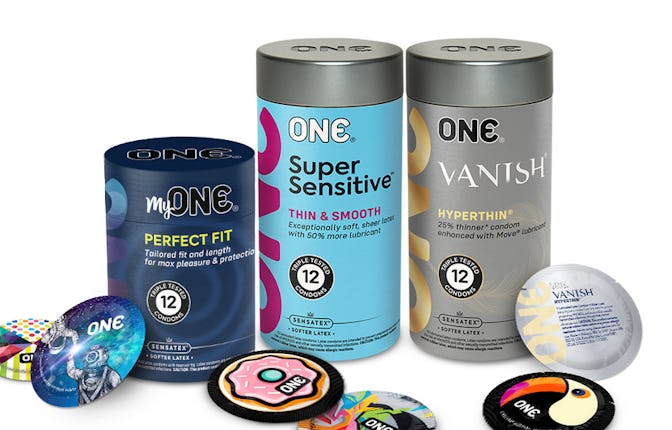The F.D.A. just approved a condom specifically for anal sex. Why?
Is it really about a clinical trial or is this just more rainbow-washing?

Yesterday, the F.D.A. announced that, for the first time ever, it is authorizing a condom to be used and marketed for anal sex. It’s kind of shocking that this is just happening now, since health experts have been begging us to use condoms for any kind of penetrative sex for decades. It’s cool that this condom company can now legally tout the benefits of condom use for anal, but if you’re like me, you’re probably wondering what’s different about these condoms that makes them so great for anal sex.
Well, the truth is that so far as I can tell, there’s no significant difference between the ONE condom approved by the F.D.A. and other condoms on the market. Like many condoms, ONE condoms are made of latex and come in various thicknesses. They do have a unique “fitted condom” option that lets you measure your penis and sample the two of over 50 differently-sized condoms that are closest to your actual size, but they also have the usual one-size-fits-all option. It appears that the real reason ONE condoms have been approved for anal is because they were tested in peer-reviewed clinical trials that conformed to F.D.A. guidelines.
This may be surprising, but until now there weren’t any condoms that had gone through the clinical trial process that the F.D.A. requires to make recommendations about their effectiveness in protecting people during anal intercourse, so companies could not legally market them for anal. The participants in this study, which was published in The Lancet, were 252 men who have sex with women and 252 men who have sex with men. They were all given condoms — both the fitted and one-sizers — and asked to track their sexual experiences.
What researchers found was the ONE condoms were found to have a failure rate less than 1% of the time during anal sex. For context, the F.D.A. benchmark was 5%, which ONE condoms easily surpassed. Interestingly, the rate of failure was higher for vaginal sex — which was almost 2%. One of the theories the researchers have about that difference may have little to do with genitalia and more to do with lube. It turns out the people in the study who had anal sex were more likely to use lube and, while they can’t say for sure, they suspect that might make a difference in failure rates. Whether the condom was fitted or not didn’t seem to make a difference, according to the study.
Honestly, when I first read about this F.D.A. approval, I vomited a little in my mouth at what I see as medicalized corporate rainbow-washing. Queer people don’t need anyone to sell us more stuff and we all already know that we should be using condoms. But the researchers on the study also surveyed over 10,000 men who have sex with men (MSM) to see if F.D.A. approval would make a difference in whether they chose to use condoms or not and, surprisingly, it made a really big difference. In fact, 69% of men surveyed said they would use condoms for anal sex if they were approved by the F.D.A., according to the survey.
Look, I am not a gay man and I don’t have a penis, but I feel solidarity with queers of all kinds and I am suspicious of anything that feels like an attempt to sell us supposedly gayer versions of goods that are readily available. It also seems criminal to me that the F.D.A. is just now getting around to approving a condom for anal while gay men have been dying of AIDS for decades.
Now that HIV treatment is more accessible and a vaccine is in the works, I can’t help but feel like this anal condom is coming too late. But honestly, if this government-aided marketing campaign makes even one person’s life bigger, gayer, or healthier — it’s fine with me.